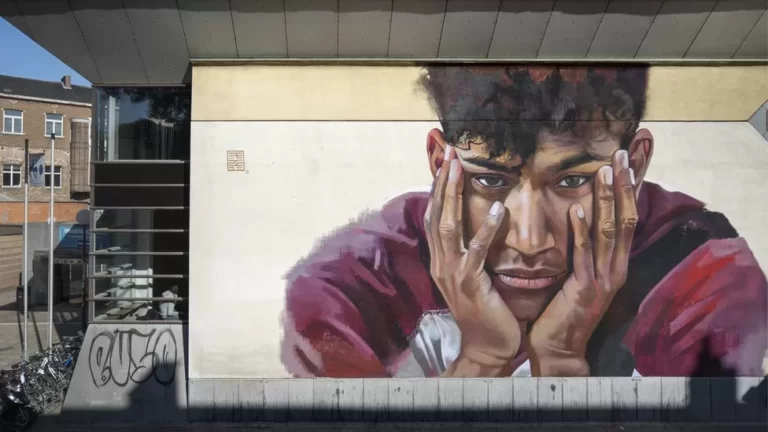
A mural of Sanda Dia has been painted at the university he was studying at in Leuven
Page Description
Explore Belgium’s response to the verdict in the Sanda Dia case, examining the implications of the decision on hazing practices and racial issues.
By Alys Davies
BBC News
1 The death of black Belgian student Sanda Dia shocked Dutch-speaking Flanders in 2018.
Warning: Some readers may find some of the details in this article upsetting.
The 20-year-old student was made to drink excessive amounts of fish oil and alcohol, made to swallow a live goldfish, and forced to stand outside in an icy pit as part of a hazing ritual for an elite fraternity at one of Belgium’s most prestigious universities, court documents say.
Hazing – the practice of putting someone in physical or emotional distress – was part of the process aspiring members of Reuzegom had to go through to gain entry to the fraternity.
During the initiation, Mr Dia collapsed and was taken to hospital. He died there two days later.
A coroner’s report would find that toxic salt levels caused by the excessive consumption of fish oil was a leading cause in his death.
More than four years on, 18 students have been sentenced to up to 300 hours of community service and a €400 ($430; £340) fine each after being found guilty in their role in Mr Dia’s involuntary death and degrading treatment.
They have also been ordered to pay damages to Mr Dia’s family, as well as to two others who were also subjected to the hazing initiation.
The court ruled that the students – members of the now-disbanded Reuzegom, whose members were traditionally associated with some of Belgian society’s elites – were not guilty of intentionally administering harmful substance causing death or illness.
However suggestions that race and class played a part in the treatment Mr Dia was subjected to during the hazing have sparked discussion since his death – particularly among young people on social media and in student circles.
Allegations of racism within the Reuzegom fraternity appeared in Belgian media, including that Mr Dia was subjected to a racial slur and singled out to clean on behalf of Reuzegom members on a separate occasion because of his race.
Other local media reports have claimed some of Reuzegom’s members were the sons of politicians and judges – pointing to their privileged positions in society.
With this in mind, some Belgians have reacted to the verdict with indignation, viewing the sentencings as overly lenient.
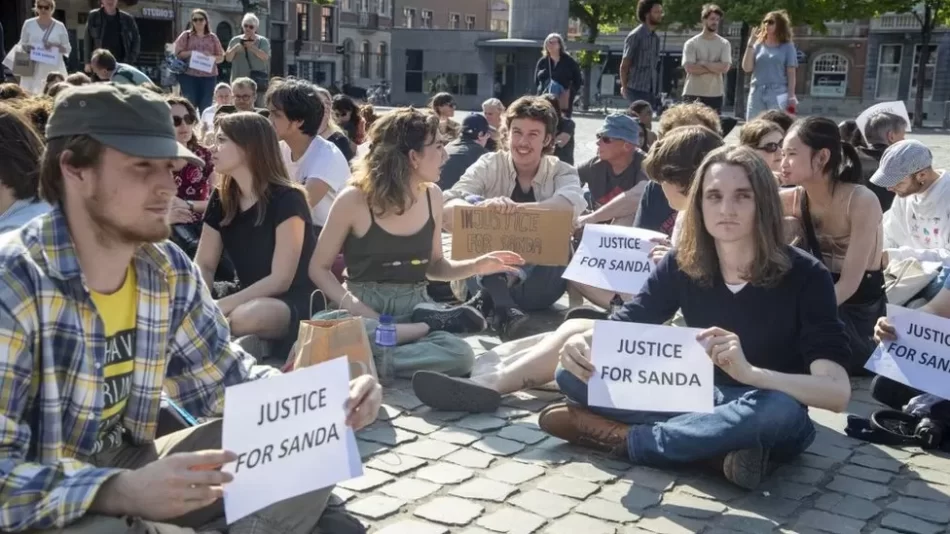
A silent protest was held in front of Antwerp’s court of appeal on 27 May
On TikTok, the hashtag #justiceforsanda has gained more than 6.5m views.
Protests have also taken place in the cities of Antwerp, Brussels, Gent and Leuven – the university city where Mr Dia studied. Another has been organised in Brussels on Sunday.
“Everybody is just angry and disappointed in the Belgian justice system,” Eliza Plesea, a 22-year-old student and Brussels protest co-organiser, told the BBC.
Speaking about the sentencings, she said, “In Belgium, if you take the bus but you don’t have a ticket… you get a higher fine for that” than what the students involved in hazing received.
Following the court ruling, one of the students’ defence lawyers, John Maes, described the sentencings as “balanced and well reasoned”.
But protest organiser and student Jean Kitenge, 25, feels race “definitely” played a part in Mr Dia’s death.
Why is hazing so common?
Speaking to the BBC, Mr Kitenge said that at Belgian universities, it is common for students to be subjected to “humiliation” as part of society initiations, but some are subjected to more extreme treatment than others.
“Everyone gets humiliation independently of their colour, but some people have some remarks which are not given to others,” Mr Kitenge, president of the youth branch of the French speaking DéFI party, said.
“Justice is not for everyone in Belgium.”
Others disagree. During the trial of the 18 students, a defence lawyer responded to Mr Dia’s father’s questioning of why his son did not survive the hazing, stating in quotes cited by Dutch newspaper NRC Handelsblad: “It has nothing to do with colour and everything to do with physique, with height, with weight.”
Mr Maes meanwhile praised the court for rising “above the war language” of recent years with its ruling.
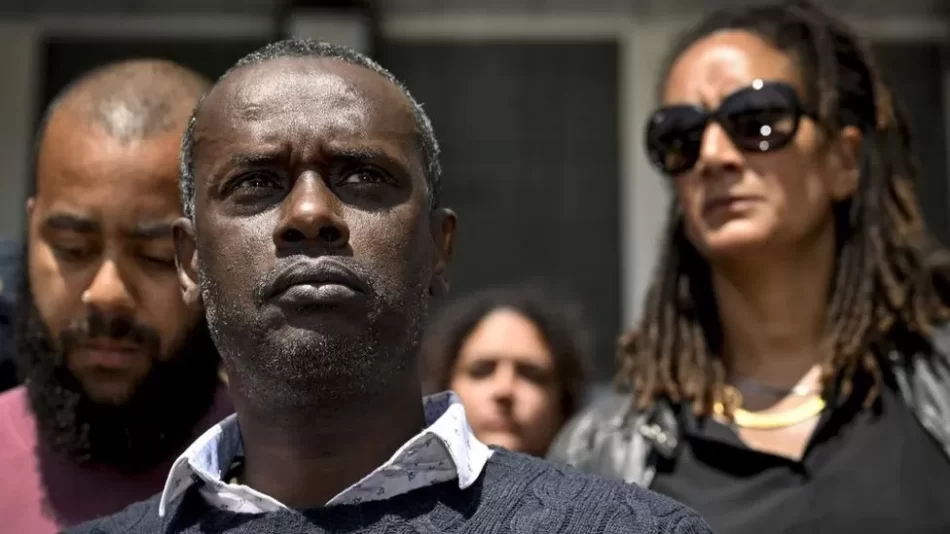
A lawyer for Sanda’s father Ousmane Dia say they will not recommend that he appeals the court’s verdict
Some of Mr Dia’s family say the ruling has left them with “mixed emotions”.
“We said from the beginning that we are not spiteful people and we don’t want anyone in jail,” Seydou De Vel, Mr Dia’s brother, said in an interview with Flemish TV earlier this week.
But he added that there were still questions about his brother’s final hours.
One is who was responsible for administering the fish oil to Mr Dia. The students have not divulged who was responsible for administering it.
“It’s just very painful not to know those things when those 18 Reuzegom defendants know it all,” Mr De Vel said.
Sven Mary, the lawyer representing Mr Dia’s father, Ousmane Dia, said after the court verdict it was “difficult” for the family not to know the full facts. He added, however, that he would not be recommending that the family seek to appeal the verdict.
Elite fraternity Reuzegom has been disbanded since Mr Dia’s death.
The university at which it was a fraternity, KU Leuven, said sanctions were implemented against seven students who still remained at the university in 2021 – which involved their expulsion and, in some cases, lifetime banishment from registering at the university again.
“No sanction or proceedings can take away the grief over Sanda’s death,” it said in a statement to the BBC. “The fact remains that a great tragedy happened during the Reuzegom initiation ruling.
“As a university community, we will never forget Sanda and what happened.”
If you’re affected by any of the issues in this article you can find details of organisations who can help via the BBC Action Line.
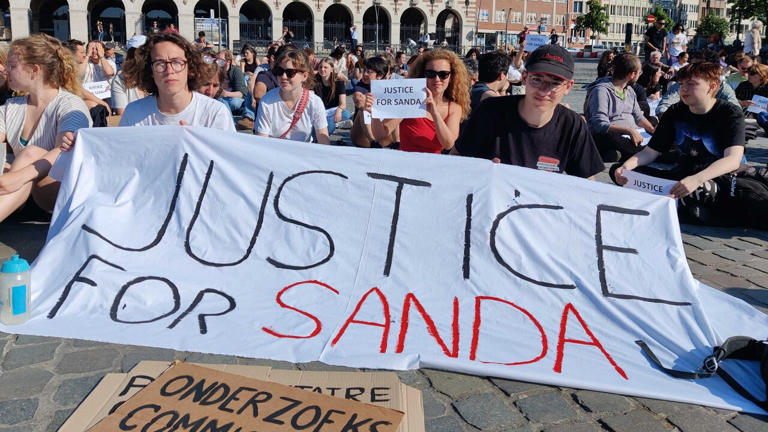
Wie herstelt het vertrouwen in de instellingen? © VRTNWS
1 Protesten in België na rechtszaak over overleden jongen
2 Zaak Reuzegom: Ja, dit is klassenjustitie
Back to menu IMPORTANT CONTENT
3 “Ja, er is klassenjustitie in België”
4 #JusticeForSanda: Achter de schermen bij Reuzegom
24 mei 2023
In 2018 stierf student Sanda Dia tijdens een doop van de elitaire studentenclub Reuzegom. Al snel bleek dit geen gewone club te zijn. Hun mensonterende dopen, racistische uitlatingen en bij wijlen gewelddadige braspartijen maakten deel uit van een wereldvisie. Die van een Vlaamse elite, die onverbiddelijk hard is en waar alleen mensen met een lange oprit bij mochten horen. De zonen van bedrijfsleiders en advocaten waanden zich onaantastbaar. Ze namen de duurste advocaten onder de arm om zich te verdedigen tijdens het proces.
Wij spraken met Douglas De Coninck, misdaadjournalist bij De Morgen en auteur van het boek ‘Ontmenselijkt. Achter de schermen bij studentenclub Reuzegom.’ Om een inzicht te krijgen in de donkere wereld van Reuzegom en hoe dat tot de dood leidde van Sanda Dia.
5 Youtuber Acid deelt namen van Reuzegommers
1 jun 2023
De populaire Vlaamse YouTuber Acid kan een week lang geen nieuwe video’s meer posten na zijn video waarin hij namen, foto’s en jobs van Reuzegommers onthulde. Die video is intussen offline gehaald. “We hebben de inhoud verwijderd en een waarschuwing gegeven aan het kanaal wegens schending van ons beleid rond intimidatie”, klinkt het.
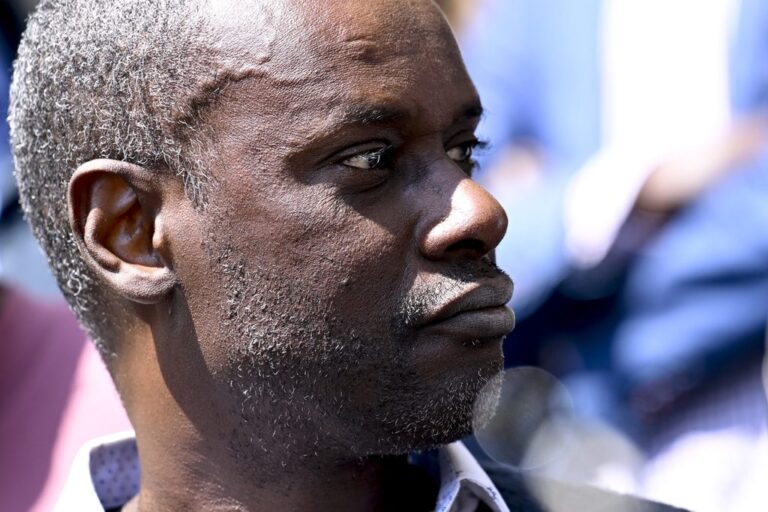
Sanda’s father has expressed dissatisfaction with the way KU Leuven has handled the incident and aftermath. Credit: Belga
2 KU Leuven accused of concealing truth about student hazing death
Sunday, 4 June 2023
By The Brussels Times with Belga
Ousmane Dia, father of Sanda, who tragically died during a Reuzegom student society initiation, has strongly condemned Belgium’s KU Leuven University for allegedly withholding the truth.
In an interview published by Humo on Saturday, Dia expressed deep disappointment in the justice system. Joined by Sanda’s grandmother, Makemu Meunier, and their lawyer Sven Mary, he said, “Sanda was my son, my only son. They took him away from me. Now, the court has also slapped me. Sanda didn’t receive the respect he deserved.”
Dia also expressed dissatisfaction with the response from KU Leuven and its rector, Luc Sels. He said, “When a student from your university dies, as rector, it seems to me you should find out what happened. You hold the involved parties accountable, you intervene decisively. Luc Sels did not do this.”
Dia further suggested that Sels should have expelled the members of the Reuzegom society from the university.
“He should have threatened them with halting their studies. Students who saw everything but were not responsible for Sanda’s death would have then spoken out. Sels also failed to take civil action, which would have given him access to all the information in the legal case. He quietly let the boys off the hook. KU Leuven is responsible for the fact that the truth was not revealed, even during the trial,” Dia added.
Sanda’s father believes his son was singled out due to his skin colour. He said, “People will try to argue otherwise and point to another boy of colour in the society. But as a father, I say what I feel deep in my heart: Reuzegom, an elitist student club, brought in Sanda, someone who didn’t fit their standard. His father didn’t have a big house with a garden. Sanda was too small for them. And they wanted to prove it.”